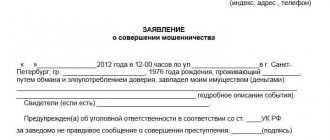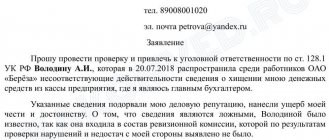From time immemorial, there have been people who dream of taking possession of other people's property in an easy way, by gaining the trust of the victim or by deceiving him. In legal language, such actions are called fraud.
And in order for affected citizens and legal entities to protect their rights, in many cases it is necessary to write a statement to the prosecutor’s office about fraud.
To ensure the legal literacy of the common man, in this article we will talk about how to correctly write a statement to the prosecutor's office regarding fraud (it can be downloaded here), bring the swindler to criminal liability and get your money back. So.
When can and should you contact the prosecutor's office regarding fraud?
First of all, it should be understood that fraud as an offense has many manifestations. If you open the domestic Criminal Code, you can find as many as 6 articles in it, devoted to various forms of fraud.
We should also not forget that for minor offenses (within 1 thousand rubles) administrative liability arises, provided for in Art. 7.27 Code of Administrative Offenses of the Russian Federation.
Most fraud cases are handled by the police. However, if fraud has occurred, contacting the prosecutor's office may also be advisable. Thus, a complaint should be filed with this authority when police officers refused to initiate a criminal case at the request of the injured party.
In addition, a statement to the prosecutor's office is written in the case when the subject of fraud is an official of an enterprise or institution. In all other cases, the prosecutor's office does not consider fraud, but transfers the materials to the police for further work with them.
Where to apply
Before considering this issue, we draw the attention of readers to the fact that the application must be submitted as quickly as possible, immediately after you discover a violation of your rights, even if you are not sure of the qualifications of the offense.
So, you can submit your application:
- To the territorial police department at the place where the crime was committed. If there were several episodes of illegal actions, choose the area where the last crime or the majority of those committed was committed. You can submit an application in person or through the official website of the Ministry of Internal Affairs. Based on practice, they will begin consideration faster if you submit your application in person to the duty station. There, your written request must be registered in the message book and you must be given a so-called coupon indicating the assigned number. Under no circumstances refuse to take this ticket, keep it carefully - in case of red tape and negligence on the part of the police, this document will be needed.
- To the prosecutor's office. As a general rule, such applications are not submitted to this organization. But, by virtue of the job descriptions of this department, its employees are obliged to accept and register any application from citizens. Therefore, your statement regarding fraud will be accepted by the prosecutor’s office and sent to the police department within three days, with instructions to conduct a procedural check. The disadvantage of contacting the prosecutor's office can be considered, taking into account the referral under jurisdiction, a longer period of consideration (sometimes this is very important, the clock can count). One of the advantages is the unconditional implementation of the instructions of prosecutors by police officers, so there is a high probability that the consideration of an application received from the prosecutor’s office will be treated more carefully and promptly.
Please note that if damage is caused as a result of fraudulent actions on the part of representatives of any legal entities, you can, in parallel with the statement of crime, submit to the district prosecutor's office an application for the need to check the activities of the organization in general.
Composition of the crime and participants
Generally, fraud refers to obtaining money or property through deception or breach of trust.
Transferring money using forged or knowingly false documents is also considered fraud. This type of crime is typical for the banking, insurance or social sectors.
Computer scammers are also common, using modern technologies to gain access to other people’s data and bank accounts.
Fraud consists of deliberate evasion of execution of contracts concluded between business representatives.
What distinguishes fraud from theft or robbery is that the victim voluntarily transfers property to the attackers.
Fraudsters can act either alone or in organized groups. The injured party is both citizens and enterprises (institutions). However, there may be several victims of fraud.
Fraud involving or in relation to individual entrepreneurs and commercial organizations
Until recently, the injured party had the right to file a complaint with the prosecutor's office about fraud by a legal entity. Criminal liability for enterprises was provided for in Article 159.4 of the Criminal Code of the Russian Federation. However, this provision has now been excluded from the legislation.
Therefore, officials of organizations or individual entrepreneurs are responsible for fraud in the business environment. Depending on the crime, liability arises under Part 3 or 5 of Article 159.
However, it happens that the fact of illegal actions is difficult to prove. Therefore, prosecution is largely determined by a sufficient number of documents and testimony.
In addition, the participation of a criminal lawyer would also be useful. He knows first-hand how to properly protect the rights of the victim. .
Fraud involving or against an individual
In this case, an application to the prosecutor's office about fraud by an individual is submitted with reference to the relevant article of the Criminal Code of the Russian Federation. Therefore, it is advisable to study the rules of criminal law before writing a statement.
You can attach not only documents to your application, but also video footage, recordings of telephone conversations, and printouts from email. Basically any evidence you have.
Methodology for drawing up an appeal
It's not an easy job. After all, criminals often create cunning schemes that only a specialist can understand. Therefore, the victim, by virtue of the current legislation, finds himself in a dangerous situation:
- he must notify law enforcement officers about the crime;
- the facts stated in the application are verified;
- if they are not confirmed, then the accused has the opportunity to file a counterclaim for libel.
Important: the person who contacts the police is warned of liability for knowingly false denunciation (clause 6 of Article 141 of the Criminal Procedure Code (CCP) of the Russian Federation).
Article 141. Statement of a crime of the Criminal Procedure Code of the Russian Federation
Citizens and business managers need to know that the Criminal Code has several articles related to fraud. They are shown in the table:
| Article of the Criminal Code | Type of fraud |
| 159 | In general understanding |
| 159.1 | In the monetary sphere |
| 159.2 | When receiving payments from the budget |
| 159.3 | Using bank cards |
| 159.5 | In insurance |
| 159.6 | Related to the use of computer technology |
Article 159. Fraud of the Criminal Code of the Russian Federation
Article 159.1. Fraud in the field of lending of the Criminal Code of the Russian Federation
Article 159.2. Fraud in receiving payments under the Criminal Code of the Russian Federation
Article 159.3. Fraud using payment cards of the Criminal Code of the Russian Federation
Article 159.5. Fraud in the field of insurance of the Criminal Code of the Russian Federation
Article 159.6. Fraud in the field of computer information of the Criminal Code of the Russian Federation
Knowledge of the law will allow you to suspect and stop selfish deception in one of the listed areas. When drawing up an appeal to law enforcement officers, it is advisable to indicate not the paragraph number of the Criminal Code, but the branch of the relationship. This will make it easier for police to classify a crime.
Procedure and terms for consideration of the application
Received materials are signed by the responsible employee of the prosecutor's office. He checks the correctness of the application and the presence of all required information in it.
Then there is a certain procedure for checking the information contained in the appeal. Depending on the specific case, the period for processing the application is from 3 to 10 days.
After this, the prosecutor's office issues a decision based on the results of consideration of the application. If the complaint of the victim of fraud is satisfied, then the resolution specifies a list of those actions (with deadlines) that must be carried out by the police.
How long to wait for an answer
An appeal received to the Ministry of Internal Affairs of Russia in electronic form is considered in accordance with Federal Law No. 59-FZ dated May 2, 2006 and Order of the Ministry of Internal Affairs No. 736 dated August 29, 2014. The response will be sent to the email address specified in the request.
Appeals are registered within three days. Then, within 7 calendar days from the date of registration, one of the decisions is made:
- accept for consideration and initiate a criminal or administrative case;
- send for consideration to another unit under jurisdiction or to court;
- not to conduct an inspection if the information provided is found to be unfounded or incorrect, and to refuse to initiate a case.
Appeals received by the internal affairs body in accordance with its competence are considered within 30 days from the date of their registration. In exceptional cases, the consideration period is extended, but not more than 30 days with simultaneous written notification of this.
Decisions or actions (inactions) taken may be appealed administratively or judicially.
If a criminal case has been opened, what next?
Let's assume that you, as the injured party, have succeeded in initiating criminal proceedings. However, one should also be active within it. First of all, it is necessary to cooperate with the investigation. In particular, you should come for interrogations and participate in other investigative actions (identification, confrontation, etc.).
The investigator also needs to immediately write a statement recognizing you as a victim and a private prosecutor. From this moment on, you have certain procedural rights.
To recover damages (material and moral) caused by fraud, a civil claim should be filed. It is not much different from the statement of claim prescribed in the Civil Procedure Code.
The only difference is that it is submitted to the investigator or court that will deal with the criminal case. In addition, more emphasis needs to be placed on the provisions of the Code of Criminal Procedure.
The law does not allow the prosecutor to demand damages from fraudsters. For this purpose, it is possible to file a claim in court for compensation for damages from the crime committed.
Let us only add that filing a civil claim does not require payment of state duty. The decision on such an application is contained in the verdict of the court in the fraud case.
What should be in the application
In this document you need to enter all the data that is at least somehow related to this case. Try to present everything in as much detail as possible so that the police do not have any additional questions. Try not to stretch the description of the situation in which the fraud was committed too much. But at the same time, it is necessary to talk about it in detail so that the police understand the principle of the actions of offenders. The document must contain the following information:
- first indicate which police department the application is being sent to;
- enter information about yourself as an applicant;
- friendly ask for help solving your problem, finding and punishing those responsible, returning property and valuables;
- describe in detail the circumstances under which you transferred the property;
- indicate the total amount of damage that caused the fraudulent activity;
- leave your contact information so that police representatives can quickly contact you if the need arises;
- if additional documents are attached to the application, they also need to be mentioned;
- if there is material evidence that can solve the crime, it should also be reported;
- Please note that you are aware that there are penalties for giving false testimony.
It would be useful to confirm that you honestly indicated the cost of the damage that was caused by the scammers. If possible, provide checks, receipts, documents confirming the transfer of money or transfer of property. The application must bear the date of preparation and a signature with a transcript.
How to write a statement to the prosecutor's office about fraud: useful tips and recommendations
Before filing a complaint with the prosecutor's office, it is useful to use our several recommendations. Here is their summary
Study the Criminal Code and Code of Criminal Procedure
We have already said above that fraudulent actions fall under several articles of the criminal law. Moreover, each of them has several parts. Therefore, it is important to correctly refer in the application to the relevant elements of the crime.
The Code of Criminal Procedure should pay attention to the rules that regulate the procedure for appealing a refusal to initiate a criminal case. They are also referred to in the statement.
Don't make categorical judgments
If you are only guessing who committed unlawful actions against you, but are not completely sure, then avoid making a categorical statement.
Otherwise, there is a risk of being held accountable for false denunciation. When you do not know the identity of the scammer, it is better to point to an unidentified person.
Avoid insults and harsh language in your application.
Practice shows that the prosecutor's office has an extremely negative attitude towards such an application. Therefore, be as correct as possible in your presentation or contact a fraud lawyer.
Justify the amount of damage caused
If you can document the extent of the damages caused, it is important to do so with convincing evidence. Naturally, they should be attached to the application.
Operate only with facts
Do not make any assumptions: state the circumstances regarding illegal actions clearly and specifically.
Leave your contact phone number
Stay in constant contact, as prosecutors may require additional information from you at any time.
Contacting the police
The responsibilities of the police include searching for the fraudster and primary evidence for further initiation of a criminal case and its transfer to the prosecutor's office. This is where you need to turn when you need to find an unknown attacker or establish the presence of malicious intent.
Immediately after realizing the fact of fraud, the injured party should immediately contact the police. You can do this in one of the following ways:
- By visiting the department in person. The law does not establish the need to apply at the place of registration. In case of several facts of offenses, it is recommended to contact the department where the last or most of them were committed. The complaint must be registered in the message log, and its author is given a ticket with information about the assigned number. It is important to keep the latter as evidence of the application, which may be useful in case of bureaucratic red tape or further litigation.
- By calling the police to the scene. The method is especially relevant when it is necessary to inspect the scene of an incident or interview witnesses to confirm fraudulent actions.
- By sending a registered letter with notification (the latter allows you to control the timing of consideration of the application by law enforcement agencies).
- Through the official portal of the Ministry of Internal Affairs.
On a note!
In practice, submitting an application in person is considered more effective, since the application is processed faster. The decision to initiate a criminal case is made within 10 days from the date of filing, of which the applicant is notified by mail.
Application Form
When you call the police, the officers will draw up a report of the crime and help you write a statement about it correctly. When this is not possible, the document can be drawn up independently in handwritten or printed text, which indicates:
- Top right: full name and title of the official, name of the police department to which the document is addressed. Immediately below them are the applicant’s details: full name, place of residence, contact phone number. For cases of fraud against minors, it is important to indicate the details of the child and his legal representative.
On a note! Lack of information about the name or title of the addressee cannot be grounds for refusing to accept an application.
- Title by or "Complaint".
- Description of criminal acts indicating the date, time, place of their commission, data of the persons who committed the fraudulent acts (if known). It also describes the circumstances and measures taken previously that will confirm that a criminal act qualifying as fraud has been committed. You can also indicate possible witnesses who can be included in the investigation of the case.
- Please initiate a criminal case and bring the perpetrators to justice.
- Mention of awareness of criminal liability when providing knowingly false testimony under Art. 306 of the Criminal Code of the Russian Federation.
- A list of additional materials indicated in the text or necessary to confirm the arguments presented.
- Signature and date of compilation.
The correctness of drawing up a complaint, comprehensive coverage of what happened and the availability of evidence directly affect the speed of launching a complaint into action, the efficiency and results of the investigation.
Additional documents
When choosing documents to attach to the application, you should adhere to the so-called principle of relevance of evidence: use those that are directly related to the case and confirm one or another of the stated circumstances.
On a note! Instead of original samples, it is allowed to attach copies of them. During further consideration of the case, the receiving person will compare them with the originals to ensure their authenticity.
Examples of possible options for attachments to a complaint:
- receipt (in cases of non-repayment of borrowed money and their misappropriation);
- phone call printouts;
- bank statements about debits (in case of illegal withdrawal of money from the card);
- documents on ownership of an apartment, house, garage (when the object of fraud is real estate);
- documents for equipment (in case of its misappropriation by fraudulent means);
- invoices, sales agreements concluded with the attacker;
- screenshots of correspondence or fraudulent sites;
- certificate of income (to confirm the significance of the material damage caused).
Refusal to initiate a case
If the police refuse to initiate a case, the decision can be appealed through the prosecutor's office or court. The applicant first needs to know the reasons for this decision. By law, the official who reviewed the application is required to notify the author of the decision (usually within 14 days). If for some reason (negligence of the police or postal workers) the notification was not sent, the victim must independently contact the police to obtain a copy of the refusal decision. It is in this situation that the coupon received during personal submission with the registration number of the document will be useful. Using it, you can quickly find the authorized employee who was entrusted with reviewing the document.
When the reason for the refusal is found out, with which the victim does not agree, you can write a complaint. At the same time, it is important to convincingly prove that the actions of government officials do not comply with the law, because:
- are unreasonable;
- contradict criminal procedural legislation;
- the reasons for refusal are not substantiated.
Sample complaint against a decision to refuse to initiate a criminal case
The complaint is given 3-10 days for consideration by the prosecutor's office or up to 5 days when considered by the court. If there are grounds, the decision to refuse is canceled, otherwise the appeal remains unsatisfied. But even in this case, the applicant has 10 days to appeal the appeal.
Types of punishment for the guilty
Fraud, qualified by Part 1 of Article 159 of the Criminal Code of the Russian Federation, is punishable by a fine of up to 120,000 rubles. or imprisonment for up to 2 years. A crime committed by a group of persons falls under Part 2 of Art. 159 of the Criminal Code of the Russian Federation, which provides for punishment in the form of a fine of up to 300,000 rubles. or imprisonment for up to 5 years. A similar punishment is imposed on someone who, by deception, stole funds from the victim in the amount of 5,000 rubles or more.
If one's official position was used for fraudulent purposes or the crime resulted in major damage, the court will be guided by Part 3 of Art. 159 of the Criminal Code of the Russian Federation and impose a penalty in the form of a fine from 100,000 to 500,000 rubles. or imprisonment for up to 6 years.
Fraud committed by a group of persons or resulting in damage on an especially large scale is punishable by up to 10 years in prison (Part 4 of Article 159 of the Criminal Code of the Russian Federation).
Parts 5-7 art. 159 of the Criminal Code of the Russian Federation are devoted to fraud in the economic sphere and are used to qualify such acts as failure to fulfill obligations under contracts or agreements. The parties to such proceedings are legal entities. Punishment here ranges from a fine (from 100,000 rubles) to imprisonment for up to 10 years.
Article providing for fraud
Art. is devoted to fraud. 159 of the Criminal Code of the Russian Federation, the notes to which describe the criteria used to qualify illegal actions of appropriating someone else’s property.
The main signs of fraud are:
- providing false information about events, an individual, his intentions or actions;
- fraudulent acquisition of property for temporary use and its non-return, refusal to transfer funds for services received or goods purchased;
- refusal to fulfill debt obligations under a loan agreement, written or oral agreement related to finance or property;
- misappropriation of other people's funds.
Punishments for fraud are given in Article 159 of the Criminal Code of the Russian Federation.
In addition, the legislative framework in this area is formed by:
- Federal Law No. 162-FZ dated December 8, 2003;
- Federal Law No. 377-FZ dated December 27, 2009;
- Federal Law No. 207-FZ dated November 29, 2012.
Previously, illiterate people, old people and minor children often became victims of such crimes. However, the practice of the last decade suggests that fraud today is most common in business and business, that is, educated people with high incomes become victims.
Liability for perjury
Filing an application with false accusations of fraud is qualified under Art. 306 of the Criminal Code of the Russian Federation as a false denunciation.
Since such an act carries a high social danger, creates an additional burden on law enforcement agencies and violates the rights and interests of the accused citizens, the punishment for it may be associated with imprisonment:
- up to 2 years if the crime was committed for the first time without aggravating circumstances;
- up to 6 years, if the false denunciation was accompanied by the artificial creation of evidence.
In this regard, lawyers advise carefully checking your suspicions before initiating a criminal case.
Penalties for giving false information are provided for in Article 306 of the Criminal Code of the Russian Federation.
Online fraud: types
There are many ways to deceive people over the Internet.
The ingenuity of scammers knows no bounds; new techniques are constantly appearing aimed at luring money out of Internet users. It is impossible to describe all types of fraud, so below is general information about methods of deception, grouped according to similar characteristics. Existing types of fraud on the Internet can be divided into 2 large groups:
- Software. Money is written off from the user using special means: viruses, fake sites, etc.
- Psychological. The basis for fraud is the human factor: users independently transfer money to the accounts of criminals, believing in the story they set out.










